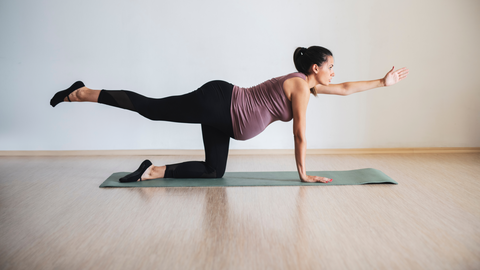What's New on Embodia - Pilates for Pelvic Health

What's New on Embodia - Pilates for Pelvic Health
This course includes
The instructors
Overview
Pilates is far more than a fitness trend—it began as a rehabilitation method and continues to offer powerful strategies for supporting pelvic health today. In this free course, Rochenda Howard will explore how Joseph Pilates’ original principles connect with modern physiotherapy research, clinical practice, and digital education tools.
We’ll revisit Pilates’ roots in rehabilitation and the concept of the pelvis as the body’s “powerhouse”—the centre from which posture, alignment, and efficient movement flow. Building on this foundation, the session will highlight how pelvic stability relies on two key muscle control strategies:
-
Anterior support: abdominal layer recruitment, building from the deeper lower abdominals.
-
Posterior support: gluteal layer recruitment, with a focus on the deeper, lower gluteals.
You’ll also learn how the diaphragm and pelvic floor integrate into both strategies, creating a dynamic system for load transfer and movement efficiency.
Drawing from recent research, we’ll examine how neuromuscular dysfunction—especially differentiation within the gluteus maximus—impacts pelvic alignment and contributes to pain. You’ll see how neural inhibition, central sensitization, and neuroplastic changes in the brain can alter motor control, making posture and stability harder to restore.
The clinical takeaway: traditional Pilates exercises may not automatically retrain these systems if the pelvis is out of alignment or pain is present. Instead, success lies in process-driven retraining—targeting the lower gluteus maximus to act as a sling under the pelvis, supporting neutral alignment and restoring efficient movement patterns.
Finally, this session will introduce Clinic Academy, a customizable platform for building and sharing online education. You’ll discover how Pilates-informed pelvic health strategies can be integrated into your own branded courses, patient education programs, and memberships to expand your clinical impact.
Learning Objectives
In this session you will learn:
-
The rehabilitation origins of Pilates and its focus on the pelvis as the body’s powerhouse.
-
The layered muscle strategies that support pelvic stability: anterior (abdominal) and posterior (gluteal) systems.
-
How the diaphragm and pelvic floor reinforce both strategies.
-
Insights from current research on gluteal differentiation, neural inhibition, and neuroplastic changes in pain.
-
Practical applications for retraining muscle function and restoring neutral pelvic alignment.
-
How to leverage Clinic Academy to host your own courses and pre-set programs (including Questionnaires) for patients and the general public.
Audience
This course is ideal for pelvic health physiotherapists, occupational therapists, women’s health specialists, movement educators, clinic owners, and any clinician who wants to grow beyond one-on-one care and foster a thriving pelvic health community.
Relevant disclosures: The instructor receives profit from some sales from products mentioned at the end of this course.
Evidence-Informed Practice in Context
One of the strengths of this community is the thoughtful dialogue that emerges when we bring evidence and practice together. During the live webinar, a participant asked:
"We now know that there is no longer strong evidence that pelvic instability is part of the pregnancy-related PGP dialogue. The pelvis is Stable, Safe and Self-Manageable, as demonstrated in the paper by Jodie Pulsifer et al. (2022). How do you reconcile your approach in Pilates with the building evidence that instability is an unhelpful narrative in pregnancy and PGP?"
This kind of critical, evidence-informed questioning is exactly what moves our profession forward. As you go through the course, we invite you to hold this balance in mind: honoring Pilates’ rehabilitation roots and practical strategies for retraining, while also integrating the evolving research and language that shape contemporary pelvic health practice.
We’re excited to have you here—let’s dive in!
The instructors

Embodia is an all-in-one practice management system that lets clinicians and clinic owners power their practice all from one platform.
We are on a mission to transform the way healthcare is delivered by empowering clinicians with the tools, technology, and education to deliver data-driven care, and empower clinics and clinic owners to maximize their success.
Embodia offers an unmatched breadth and depth of services including recorded and live online courses, HEP, telerehab, billing, charting, reporting, scheduling, two-way messaging, and more.
We are committed to building new solutions for an antiquated healthcare system and to helping physiotherapists and rehab pros globally redefine themselves and their expertise in a changing world.

B.A. (P.E.), B.Sc.P.T., M.Sc.
Rochenda is a Physiotherapist and graduated from the University of Toronto. Additionally, she holds a B.A. in Physical Education (University of Western Ontario) and an M.Sc. Research degree in Rehabilitation Therapy (Queens University, Canada).
Rochenda has a special interest in muscle function and motor learning and in how biomechanical and muscle / movement imbalances contribute to painful conditions. She has continued to pursue this passion for more than 25 years, focusing exclusively on the development of a PILATES–based Physiotherapy treatment system. While living in Hong Kong Rochenda had the privilege to work extensively with Julia Ellis (RBS (TTC), FISTD, ARAD), a gifted ballet teacher, choreographer and Pilates ‘guru’ and together they founded the successful BET Pilates Centre in 1994. They were the first to introduce Pilates in Hong Kong and East Asia and the first in the region to offer an exclusively Pilates –based Physiotherapy approach. In 2013, Rochenda returned to her native Toronto and established a small PhysioPilates clinic in the West- end where she continues to maintain a full-time practice. In 2006, Rochenda published the first rigorously designed research study on a Pilates - based physiotherapy intervention, the results of this study presented at several conferences internationally.
Rochenda is a passionate educator having co-developed the BET Pilates training curriculum and she has been active internationally teaching and mentoring Physiotherapists in this system since 1996.
In her spare time, Rochenda enjoys competitive swimming, outdoor activities, cycling, travel, spending time with her two daughters and a good espresso.
Contact Information: betphysiopilates.com; (647) 748-1889; rochenda@betphysiopilates.com
Material included in this course
-
Course materials
-
Welcome and slides
-
Introduction
-
Pelvis, Posture, Pregnancy, Pain, and Pilates - Introduction to Lecture
-
Pregnancy Throws off the 'Centre'
-
Traditional "Pilates" Exercise Training
-
Rethink Exercise Therapy
-
Conclusion
-
Question Session #1
-
A Tour of Clinic Academy
-
Question Session #2
-
General Feedback about the Course
-
Exam
-
Course evaluation (Required for US CEUs)
Patient exercises included in this course
-
PRENATAL Lower Gluteal Setting on Side: Top Leg Extension
-
PRENATAL Lower Gluteal on Side: Clam
Has this course been approved for CEUs (Continuing Education Units) for Physical Therapists and Physical Therapy Assistants in the US?
Yes, Embodia is a rule-approved CE provider of the PT Board of Florida (# 50-54793), a licensed CE sponsor of physical therapy continuing education by the Illinois Department of Financial & Professional Regulation (IDFPR #216.000415), an approved provider of continuing education by APTA Massachusetts, an approved provider of the Oklahoma Board of Medical Licensure & Supervision - Physical Therapy (#50-54793), and an approved provider of continuing education for Physical Therapists and Physical Therapist Assistants in California (CA) by Redefine Health Education, a recognized approval agency of the Physical Therapy Board of CA.
Courses approved by other state boards in the following jurisdictions are likely accepted for licensure credit based on the state regulation:
AL | AK | AR | CO | CT | DE | GA | HI | ID | IL | IN | IA | KS | KY | ME | MA | MI | MO | MT | NE | NH | NC | ND | OK | OR | PA | RI | SC | SD | UT | VT | VA | VI | WA | WI | WY
Please reach out to your state licensing board to confirm. If you have a specific question about CEU approval for this course in your state, please direct your inquiry to info@redefinehealthed.com.
The following states are not pre-approved: AZ, DC, LA, MD, MN, MS, NM, NV, NY, NJ, OH, TX, WV
Participants licensed in states not pre-approved may file for individual approval using the instructions on this document.
US PTs and PTAs: How many CEUs has this course been approved for?
This course has been approved for 0.5 CEUs (Continuing Education Units) for Physical Therapists and Physical Therapy Assistants in the US. Please see the FAQ 'Has this course been approved for CEUs (Continuing Education Units) for Physical Therapists and Physical Therapy Assistants in the US?' for a detailed list of the approved states. In order for your US jurisdiction information to appear on your course certificate, you must complete your jurisdiction information on your Embodia profile as per this guide.